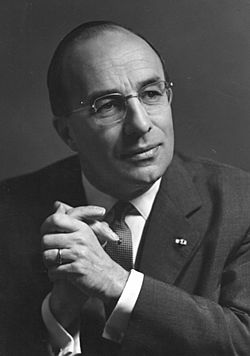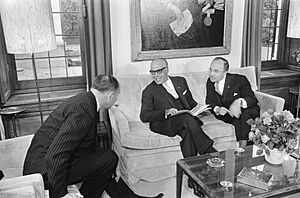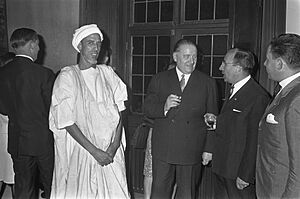Jo Cals facts for kids
Quick facts for kids
Jo Cals
|
|
|---|---|

Jo Cals in 1966
|
|
| Prime Minister of the Netherlands | |
| In office 14 April 1965 – 22 November 1966 |
|
| Monarch | Juliana |
| Deputy |
See list
Anne Vondeling
Barend Biesheuvel |
| Preceded by | Victor Marijnen |
| Succeeded by | Jelle Zijlstra |
| Minister of Education, Arts and Sciences |
|
| In office 4 February 1962 – 23 April 1963 |
|
| Prime Minister | Jan de Quay |
| Preceded by | Marga Klompé (Ad interim) |
| Succeeded by | Marga Klompé (Ad interim) |
| In office 2 September 1952 – 7 November 1961 |
|
| Prime Minister |
See list
|
| Preceded by | Theo Rutten |
| Succeeded by | Marga Klompé (Ad interim) |
| State Secretary for Education, Arts and Sciences |
|
| In office 15 March 1950 – 2 September 1952 |
|
| Prime Minister | Willem Drees |
| Preceded by | Office established |
| Succeeded by | Anna de Waal |
| Member of the House of Representatives |
|
| In office 2 July 1963 – 14 April 1965 |
|
| In office 20 March 1959 – 19 May 1959 |
|
| In office 3 July 1956 – 3 October 1956 |
|
| In office 15 July 1952 – 2 September 1952 |
|
| In office 19 August 1948 – 15 March 1950 |
|
| Parliamentary group | Catholic People's Party |
| Personal details | |
| Born |
Jozef Maria Laurens Theo Cals
18 July 1914 Roermond, Netherlands |
| Died | 30 December 1971 (aged 57) The Hague, Netherlands |
| Cause of death | Brain tumor |
| Political party | Catholic People's Party (from 1945) |
| Other political affiliations |
Roman Catholic State Party (until 1945) |
| Spouse |
Truus van der Heijden
(m. 1941) |
| Children | 3 sons and 2 daughters |
| Alma mater | Radboud University Nijmegen (LL.B., LL.M.) |
| Occupation | Politician · Diplomat · civil servant · Jurist · Lawyer · Prosecutor · Judge · Researcher · Corporate director · Nonprofit director · Academic administrator · Lobbyist · Teacher |
| Military service | |
| Allegiance | |
| Branch/service | Royal Netherlands Army |
| Years of service | 1945 (Active duty) 1945–1946 (Reserve) |
| Rank | |
| Unit | Justice Corps |
| Battles/wars | World War II |
Jozef Maria Laurens Theo "Jo" Cals (born 18 July 1914 – died 30 December 1971) was an important Dutch politician. He was a member of the Catholic People's Party (KVP), which is now part of the Christian Democratic Appeal (CDA) party. Jo Cals served as the Prime Minister of the Netherlands from April 1965 to November 1966.
Cals studied law at the Radboud University Nijmegen. After finishing his studies, he worked as a lawyer and a prosecutor. He also taught law and economics. In 1948, he became a Member of the House of Representatives, which is like being a member of parliament.
He held several important government jobs. From 1950 to 1952, he was a State Secretary for Education, Arts, and Sciences. Then, from 1952 to 1961, he became the Minister of Education, Arts, and Sciences. After a short time back in parliament, he was asked to become Prime Minister.
As Prime Minister, Jo Cals led the country during a time of change. His government worked on big social changes, like improving social security. They also helped close coal mines in Limburg and planned new city developments. He was known for being a very organized and hardworking leader.
Contents
Who Was Jo Cals?
Early Life and Education
Jozef Maria Laurens Theo Cals was born in Roermond, a city in the Netherlands, on 18 July 1914. After finishing high school, he first thought about becoming a priest. However, in 1935, he decided to study law instead.
He went to Radboud University Nijmegen and graduated in 1940. For several years, he worked as a lawyer in Nijmegen. He also taught economics at his old high school in Roermond.
A Career in Politics
Jo Cals started his political journey in 1945. He became a leader for the Catholic People's Party in the local council of Nijmegen. In 1948, he was elected to the House of Representatives. This was his first step into national politics.
He quickly moved into government roles. From 1950 to 1952, he was a State Secretary for Education, Arts, and Sciences. This meant he helped the main minister in that area.
Then, from 1952 to 1963, he served as the Minister of Education, Arts and Sciences. During this time, he helped create a very important law called the Mammoetwet. This law completely changed how secondary education worked in the Netherlands. He even set a record by speaking for almost seven hours during the debate about this law!
After 1963, he returned to being a regular member of the House of Representatives. He also joined boards for universities and cultural councils.
Becoming Prime Minister

In 1965, the previous government collapsed. Jo Cals was then asked to form a new government and become the Prime Minister of the Netherlands. He took office on 14 April 1965.
His time as Prime Minister was challenging. After many years of strong economic growth, the country faced a small economic slowdown. This meant that plans for new sports halls, roads, and houses had to be slowed down.
One big change during his leadership was the closing of coal mines in Limburg. The government made plans to help the former miners find new jobs and get new training.
This period was also a time of social change and unrest, often called 'the sixties'. There were protests by groups like the Provo movement and construction workers. New political parties also started to appear, wanting to change how politics worked.
In October 1966, there was a big political disagreement. Norbert Schmelzer, a leader from Cals's own party, proposed a motion against the government. This was very surprising in Dutch politics. Because of this, the government resigned that same evening. Jo Cals left office on 22 November 1966.
Life After Politics
After leaving his role as Prime Minister, Jo Cals was only 52 years old. He mostly retired from active politics. He continued to work in different areas, including business and non-profit organizations. He also served as a diplomat and advised the government on various matters.
Cals was known for being a very effective manager and for his strong work ethic. His government made important social changes, like improving social security. They also helped with urban development in big cities.
On 5 December 1966, he received the special honorary title of Minister of State. This title is given to politicians who have done great service to the country. He continued to share his thoughts on political issues.
Sadly, Jo Cals was diagnosed with a brain tumor. He passed away in December 1971 at the age of 57. He is remembered as one of the longest-serving cabinet members in Dutch history.
Jo Cals and Scouting
Jo Cals was also involved in Scouting. In 1930, he was one of the first members of "De Katholieke Verkenners" (The Catholic Scouts). He even attended the 4th World Scout Jamboree in Hungary in 1933.
After World War II, he played a key role in rebuilding Catholic Scouting in the Netherlands. It's interesting to note that during his second term as Minister of Education, his former Scout Master, René Höppener, became the State Secretary for Education.
Honors and Awards
Jo Cals received several important honors for his service to the Netherlands:
- He was made a Knight Grand Cross of the Order of Orange-Nassau on 27 July 1963.
- He became a Commander of the Order of the Netherlands Lion on 5 December 1966.
- He was also given the honorary title of Minister of State on 5 December 1966. This title is a special recognition for his contributions to the country.
See also
 In Spanish: Jo Cals para niños
In Spanish: Jo Cals para niños
 | Laphonza Butler |
 | Daisy Bates |
 | Elizabeth Piper Ensley |


